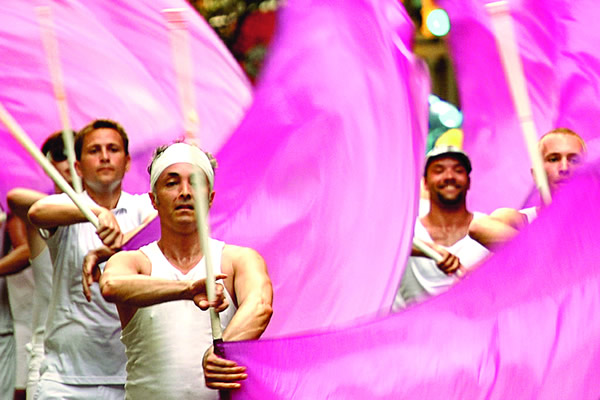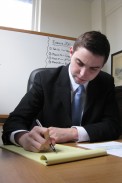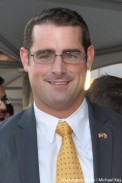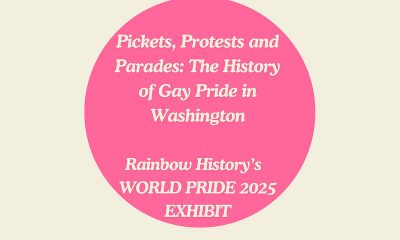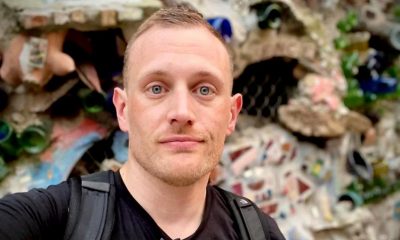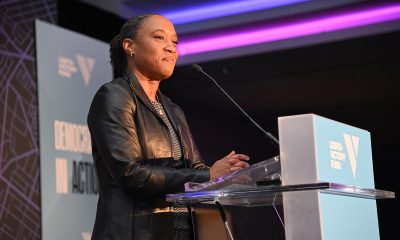Arts & Entertainment
Progress in Pennsylvania
A mini trend of change as openly gay officials emerge
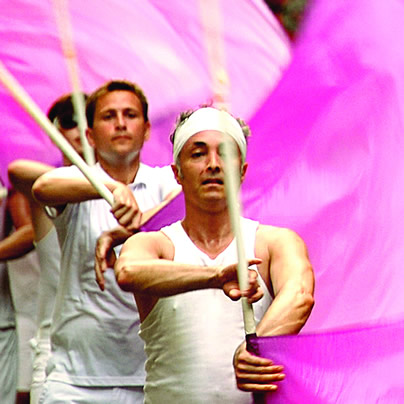
When Philadelphia attorney Brian Sims set his sights on a seat in Pennsylvania’s storied state House last September, the odds were stacked against him: Not only would he be a political newcomer, but he also was running as an openly gay man in the same state that once elected virulently homophobic former U.S. Sen. Rick Santorum.
Seven months later, however, he won his primary race to represent the 182nd District in the state House of Representatives, part of a mini trend of recent gay-supportive political changes that have some wondering if a progressive wave isn’t starting to emerge in the Keystone State.
Supporters of the idea point to Sims, who is running unopposed in the November election, as well as to 24-year-old gay Harrisburg Treasurer John Campbell, who is helping the state’s capital city cope with its much publicized bankruptcy. Meanwhile, a state LGBT Equality Caucus is active, and members of the House State Government Committee recently killed efforts to amend the constitution to ban same-sex marriage.
Campbell, a college student who hopes to use tax reform to free Harrisburg from a $300 million debt pileup, believes Sims’ election could signal more positive change to come.
“All states that have passed a marriage equality bill have previously elected an openly gay legislator,” Campbell said, adding that having an out gay man in the state House would go far to personalize the issue of LGBT rights. “It really helps our argument that we are people too.”
Sims said LGBT supporters are making their presence known in the state. He pointed to widespread support among Pennsylvanians for a measure to add LGBT-friendly language to the state human relations act.
The legislation, House Bill 300, has stalled several times in committee.
“I’ve spent years traveling the state talking about LGBT rights and one of the things I like to tell people is the state is not as conservative as people think it is,” said Sims, adding that the state’s failure to pass LGBT-inclusive hate crimes and anti-bullying measures isn’t necessarily reflective of constituent sentiment.
Sims, former board president of Equality Pennsylvania, is poised to become the state’s first openly gay legislator. He has a background of working with attorneys, legislators and community organizations on issues ranging from gender and pay inequity to environmental regulation. And though he didn’t make LGBT issues a campaign lynchpin, he plans to continue including LGBT matters alongside corporate income tax reform and other key issues as he moves forward, he said.
He said such matters increasingly reflect the interests and spirit of the state.
“The state is progressing — we are growing stronger by the minute,” he said. “I don’t necessarily know that our current laws and political structure really do reflect how forward-thinking the people in the state are.”
Opinions of Pennsylvania’s progress are as diverse as its record supporting gay and lesbian residents. The state has historically been a maverick on some fronts, among them the establishment of a state Council for Sexual Minorities in the mid ’70s, and the recent passage of the state’s 28th local LGBT-inclusive non-discrimination ordinance.
And in Philadelphia, home to what’s considered the nation’s oldest operating gay bookstore in Giovanni’s Room, a vibrant LGBT community thrives, according to Mark Segal, who has spent 37 years chronicling the community’s ups and downs as founder of Philadelphia Gay News.
“Society is moving at a brisk pace toward equality and I think this is happening everywhere. But you also have to look at history. Philadelphia is, in many ways, the birthplace of the LGBT movement,” he said, citing the city’s 47-year history of gay Fourth of July marches as an example.
But weak spots remain. For one, those local LGBT-inclusive non-discrimination ordinances are the result of lawmakers’ failure to pass state-level legislation, and are essentially, local attempts to patch up gaps in state law.
And even as President Obama announced his support for same-sex marriage, Pennsylvania Sen. Bob Casey (D) has remained conspicuously quiet on the issue.
“[Pennsylvanians’] reputation in general is one of being pretty safely in the middle, and what that means is sometimes they’re progressive, and sometimes they’re not,” said Ted Martin, executive director of Equality Pennsylvania. “It’s a place that doesn’t want to rush out too far nor does it like to be in the end.”
The head of the state’s main LGBT advocacy group said he believes Pennsylvania is growing more progressive, just very slowly.
He pointed to recent polls showing up to 51 percent of state residents support same-sex marriage and said lawmakers he encounters no longer insist they don’t have any gays in their district.
“Are we turning a corner, are we taking some steps forward? I like to think so,” he said. “We’re certainly starting to have a conversation we never had and that’s a good thing.”
That conversation comes at a sensitive moment in regional LGBT politics. Surrounded by states passing LGBT-friendly measures, Pennsylvania has increasingly become an ideological island, a fact that could have a damaging economic impact, some say.
“Many places that already permit same-sex marriage — New York, Maryland, D.C. and others — are geographically close to Pennsylvania,” Rep. Babette Josephs told Philadelphia magazine last week. “We will be losing valuable citizens to these other states because of our backward ways; the image of Pennsylvania will continue to be tarnished.”
But turning Pennsylvania into a more progressive state presents a significant challenge. For one, the state’s political landscape remains blue at the edges, anchored by liberal Philadelphia and Pittsburgh, with a rural, conservative center.
Moreover, that center enables a powerful Republican Party that keeps the General Assembly “in a 1950s bubble,” Segal said.
But Campbell believes that makes the state better poised than most to be a national example of change.
“If a battleground state is trending toward being more open and accepting, that should lead the way for other states to do the same,” Campbell said. “It’s important to show that even Pennsylvania can do it.”
Arts & Entertainment
How queer Baltimore artists are building strong community spaces
Fruit Camp is home to tattoo artists, musicians, herbalist, and more

Fruit Camp, a tattoo and art studio in the Remington neighborhood of Baltimore, opened with a bang in February of 2020. “We had a big opening party. It was really fun. Everybody came,” says Geo Mccandlish, one of the co-founders. “It was the last rager I went to,” they said.
The pandemic shut down their shop—alongside the world—for months, but the shop survived. “We just put our stimulus checks into keeping the rent paid,” says Emi Lynn Holler, the other co-founder.
They had built the space without loans, on a low-budget, do-it-yourself ethos with hands-on help from their community. “The deeply punk shoestring budget background worked really to our advantage,” says Mccandlish.
While it wasn’t ideal, it was fitting. Mccandlish and Holler’s artistic partnership has almost always lived at the crossroads of community, DIY, and extraordinary circumstances. A decade ago they met as residents of the Bell Foundry, an arts co-op and co-living space, where sharing knowledge, making community, and living cheaply were key to getting by.
It was there that Holler gifted Mccandlish their first tattooing machine and taught them how to use it. And it was where the two of them—who also do printmaking, fiber arts, and other creative activities—started imagining co-founding a space of their own. That dream felt more urgent in 2016 when Baltimore condemned the Bell Foundry and evicted the residents, including Mccandlish, during a nationwide crackdown on artist co-ops after the Ghost Ship fire in Oakland.
Holler had by then moved to Massachusetts to pursue formal tattoo education and certifications.
“Living inside that level of precarity,” Mccandlish explains, “made us want to figure out a hybrid,” between the unique, collaborative Bell Foundry and a licensed, commercial space. “We wanted to find a way to create more safety,” says Holler.
But they didn’t just want to create safety for the two of them. When looking at spaces, they opted to lease a bigger studio—a two-story, double-row house with room for tattooing on the first floor and small studios on the second. Mccandlish said the prospect of a larger project felt “tantalizing and precious” because they felt “if you have access to something, you try to make sure that every resource that is a part of it is also shared.”
Today, in addition to tattoos, Fruit Camp holds studios for musicians, fiber artists, an herbalist, a massage therapist, and a doula. “We’re able to incubate and hold nontraditional pathways to different kinds of creative practices,” says Mccandlish.
You can consider Fruit Camp a queer business by several definitions. For one, every member of the studio identifies as queer, in some way. It also looks queer. “It’s campy and it’s pink, and we have a lot of gay art hanging around,” explains Mccandlish.
Holler says sometimes they get asked about losing potential patrons by being openly queer, but that isn’t a worry. “I think it only strengthens us,” they say. “It brings people to us who also want to find each other in that world.” They pause, “I feel like it boils down to we keep us safe and we take care of ourselves.”
Mccandlish emphasizes that “queer is the political meaning” and the “orientation to” which they do their work as a community space and business. Their shop practices are explicitly queer and trans-friendly—in addition to being “anti-racist, anti-sexist, liberation-oriented, and accessible.” For example, the shop requires masking and has consent-forward and trauma-informed practices in place. They also use cost-sharing instead of a traditional profit model with those who work in their space. “The point is not to make as much money as everybody can, the point is to work enough with a low enough cost overhead that everyone can survive without overworking.”
That is a continued goal, not a static place, they explain. “Some of our goals, we haven’t reached yet, like turning into a true worker co-op.”
But they are already making big strides in the community. For example, some patrons tell them that they are the only tattoo studio they feel safe using, due to the universal masking policies. To their knowledge, they are the only shop in Baltimore that has the policy.
Fruit Camp also has a big community name. One day Mccandlish logged onto a community Facebook group and saw an anonymous post asking about queer-friendly tattooers or tattooers who would tattoo someone who has HIV. The post said, “I’ve been turned away from five different shops.”
Immediately Mccandlish went to the comments to write that Fruit Camp would be happy to tattoo them, but instead, they found the comment section full of that recommendation already. It warmed their heart. “That feels like a very minor way that [our work] is so important.”
(This story is part of the Digital Equity Local Voices Fellowship lab through News is Out. The lab initiative is made possible with support from Comcast NBCUniversal.)
Theater
Timely comedy ‘Fake It’ focuses on Native American themes
Arena Stage production features two out actors

‘Fake It Until You Make It’
Through May 4
Arena Stage, 1101 Sixth St., S.W.
Tickets start at $59
Arenastage.org
A farce requires teamwork. And Larissa FastHorse’s “Fake It Until You Make It” now at Arena Stage is no exception.
The timely comedy focuses on Native American nonprofits fractiously housed in a shared space. Friction rises when rivals River (Amy Brenneman), a white woman operating in the Indigenous world, goes up against the more authentic Wynona (Shyla Lefner) to win a lucrative Native-funded grant.
While Brenneman (best known for TV’s Judging Amy) is undeniably a big draw, it takes a group collaboration to hit marks, land jokes, and pull off the well-executed physical comedy including all those carefully timed door slams.
As members of the six-person “Fake It” cast, Brandon Delsid and Eric Stanton Betts, both out actors of partly indigenous ancestry, contribute to the mayhem. Respectively, Delsid and Betts play Krys and Mark, a pair of two-spirited Native Americans who meet farcically cute and enjoy one of the play’s more satisfying arcs.
For Krys, every attractive man is a potential next fling, but when Mark, handsome and relatively reserved, arrives on the scene, it’s something entirely different.
Both onstage and sometimes off, Betts plays the straight man to Delsid’s waggishness. But when it comes down to real life business, the friends are on the same page: not only are the L.A.-based, up-and-coming actors intensely serious about their film and stage careers, but they’re also particularly engaged in the themes of Indigenous People found in “Fake It.”
On a recent Wednesday following a matinee and an audience talkback, they were ready for a phone interview.
In establishing whose voice was whose, Delsid clarified with “I’m the one who sounds a little like a Valley girl.”
WASHINGTON BLADE: Brandon, you’ve been with the show since its early work-shopping days in 2022 and through its debut in Los Angeles and now Washington. Have things evolved?
BRANDON DELSID: Definitely. I’ve grown up in the last couple of years and so has my character; it’s hard to know where I end and Kry begins. There’s been a real melding.
Eric and I are both queer, and to get to play these roles that are so human, imperfect, sexy, and interesting is really joyful.
As queer artists you don’t always get the chance to do work like this. So many stories are queer trauma, which is incredibly important, but it’s liberating to feel joy and ride it off into the sunset, which, without revealing too much, is kind of what we get to do.
BLADE: There’s some race shifting in “Fake It” particularly with regard to “pretendian” (a pejorative term describing a person who has falsely claimed Indigenous status).
ERIC STANTON BETTS: The last few years I’ve been on a journey with my cultural identity and place in the world. I’m a mixed BIPOC artist, my dad is Black and Native American by way of the Cherokee tribe and my mom is white.
Since 2020, I’ve tried to figure out where I belong in this cultural history that I haven’t had a tie to throughout my life; it’s gratifying to find my way back to my indigeneity and be welcomed.
In the play, race shifting is introduced through farce. But it’s never in a disrespectful way; it’s never mocked or done in a way to take away from others. The playwright parallels race shifting with gender fluidity.
DELSID: But in life, there are people posing as Indigenous, actively taking grants, and the play goes there, we don’t hold back. Larissa, our playwright, has made it clear that she’s not trying to figure it out for us. With that in mind, we hope people leave the theater interested and curious to learn more.
BLADE: Mark arrives kind of the middle of some crazy drama, bringing along a jolt of romance.
BETTS: Yeah, when I show up, we’re all sort of shot out of a cannon, struggling to keep up with the initial lie.
DESLID: A very gay cannon.
BLADE: What’s up next for you two?
BETTS: Both Brandon and I are up for the same part in a TV pilot, so one of us may be getting some very good news. I also have a Tyler Perry film coming out soon [he plays a model, not an unfamiliar gig for Betts].
DELSID: Coming up, I have a recurring part on HBO’s “The Rehearsal,” and a supporting part in “June and John,” a John Besson film. But doing “Fake It Until You Make It” in L.A. and now D.C. has been a special time in our lives. It’s 23/7 togetherness. There’s that hour for sleep.
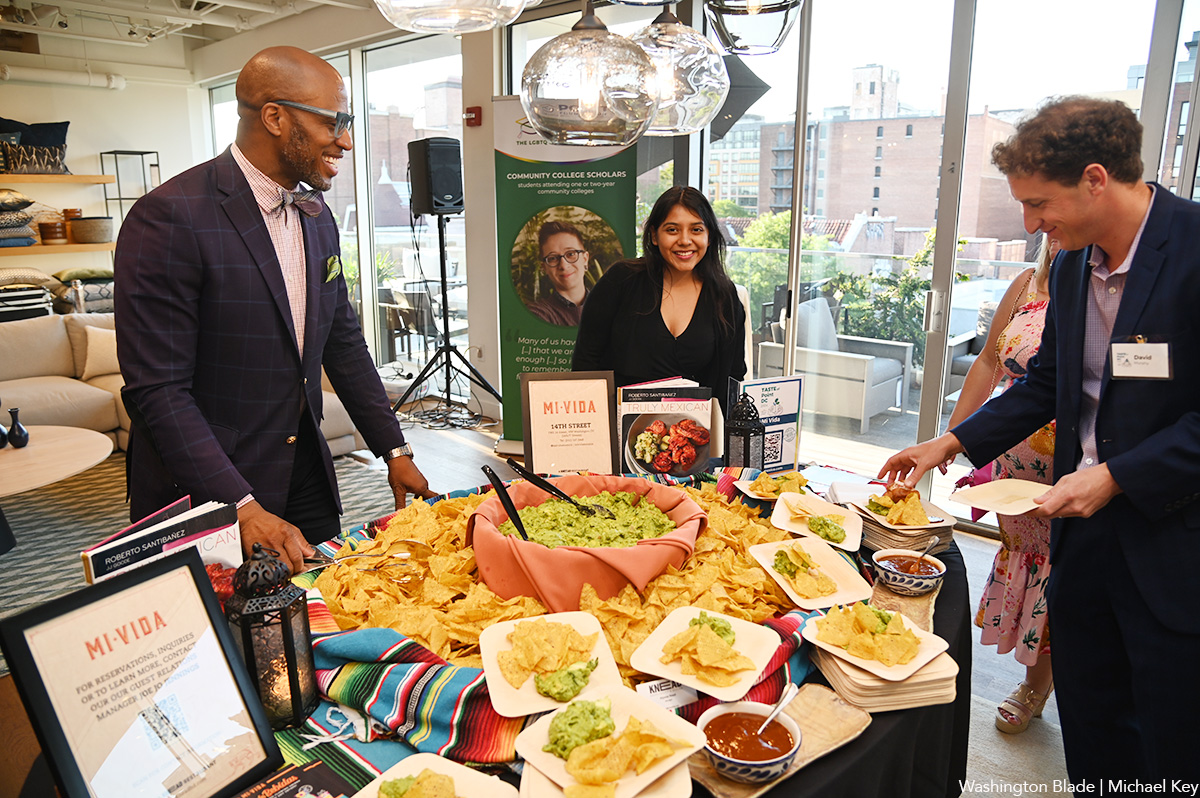
Point Foundation will host its annual “Taste of Point Reception” on Wednesday, May 7 at 6:30 p.m. at Room & Board.
The popular event will take place on the top floor and outdoor terrace at Room & Board, featuring small plates from area restaurants, hand-crafted cocktails from local mixologists, and a speaking portion where guests will hear directly from Point Foundation scholars. This year, Point is supporting a record-breaking class of 755 scholars and guests’ support will allow Point to continue its mission. Point Foundation is the nation’s largest scholarship-granting organization for LGBTQ students of merit.
Tickets are tax deductible and can be purchased at Point’s website.
-

 Federal Government4 days ago
Federal Government4 days agoHHS to retire 988 crisis lifeline for LGBTQ youth
-

 Opinions4 days ago
Opinions4 days agoDavid Hogg’s arrogant, self-indulgent stunt
-

 District of Columbia4 days ago
District of Columbia4 days agoD.C. police seek help in identifying suspect in anti-gay threats case
-

 Virginia4 days ago
Virginia4 days agoGay talk show host wins GOP nom for Va. lieutenant guv

